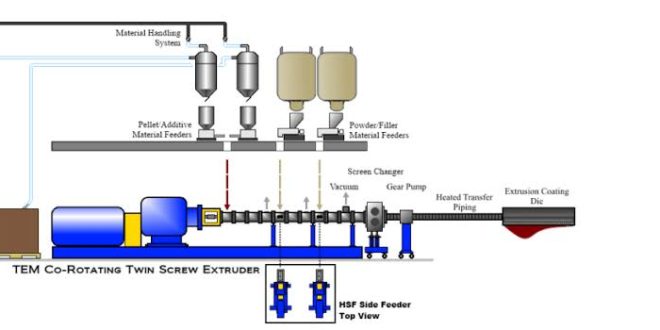Polymer test preliminaries embraced for polymer-compounders.com and materials, including twofold screw compounding, trim and expulsion capacitiesPolymer compounding is the method involved with blending or mixing of polymers and added substances and is fundamental for test preliminaries. Commonly this cycle is acted in the liquid state with an objective to accomplish a homogeneous mix, and is an essential move toward the polymer improvement process.The need for lightweight, more solid and low discharge materials in addition to the rising requests on plan is driving the polymer and plastics industry to foster new and creative materials.
Polymer material and compound advancement happens in each step of the polymer R&D cycle to create materials with various properties to the base material or to deliver material with wanted characteristics, utilizing different additives.Our polymer specialists run intensifying preliminaries inside our cutting edge polymer pilot plant facilities.In expansion to single screw compounding, Intertek additionally gives the advantages of twofold screw compounding, empowering the business to test and assess materials on limited scope. For the help of a standard material R&D assessment roughly 3-5 kg compound is expected for physical and logical material characterisation/assessment.
Details
This unit has a particular development with replaceable barrels and all standard screw elements.In expansion, Intertek performs physical and insightful material assessments. Intertek specialized polymer specialists will examine your necessities and help you with an essential or careful assessment of your polymer compounds and materials.Additional polymer handling administrations incorporate polymer preliminary infusion shaping, blown film and cast film extrusion.Contact our expert staff to find the manners by which our cutting edge offices might help your organization’s R&D, colorant, added substance, minerals, unrefined components, masterbatch and testing prerequisites.
Unique:
Polymers, with the exception of a couple, require the joining of reasonably chosen added substances to facilitate their handling and to further develop execution. The presentation of added substances into a polymer lattice is in fact portrayed as compounding. The determination of the fixings and the enhancement of intensifying systems has forever been a difficult occupation for polymer researchers and specialists. In light of the variety of polymers in their physical and synthetic viewpoints, including their sub-atomic design, a cautious methodology is constantly expected in the intensifying system to get a superior exhibition/cost proportion. Legitimate intensifying procedures to get a uniform dispersion of miniature and nanoparticulates in polymer networks during the improvement of miniature/nanocomposites are as yet a test before industrialists and scientists.
This part presents an efficient record of the traditional and current methodologies in regards to the choice of fixings, their grouping, job, joining strategies, communication with various networks and execution assessment. Separate portrayals are added for plastics and rubbers, in both the plastic and dry structures. Extraordinary consideration is given to feature the elements of intensifying hardware. A survey of the prior writing on polymer compounding is incorporated. The new systems in compound plan and the board are examined.
MARKET APPLICATIONS
- Class I clinical gadgets and parts (for example clinical gear, dressings, luers, locks, connectors, tubing)
- Class II clinical gadgets and negligibly obtrusive parts (for example catheters, needles, sheaths, careful instruments)
- Infusion shaping
- Expulsion (tube and sheet/film)



